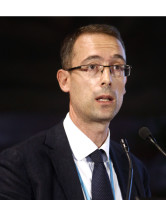Longevity, Ageing and Long-term Care
Healthy Ageing & Longevity
Cellular Ageing
AXA Chairs
France
2010.02.28
Chair for a systems approach to individual differences in longevity
To face this major challenge, the AXA Research Fund has decided to fund the AXA - Paris Descartes Chair on “A systems approach to individual differences in longevity.” The Chair Holder, Prof. François Taddei, winner of several awards (INSERM, EURYI and HFSP, etc.) for his interdisciplinary approach to aging, is particularly well-suited to lead a multidisciplinary project that brings together excellent scientists from different backgrounds.
Using advanced demographic analysis, they are studying the variability of longevity between and within countries to identify which factors are the best predictors of life expectancy. Several elements, such as medical expenditure, socio-economic level and literacy, will be taken into account. Instead of focusing on the mechanisms underlying the diseases that occur more frequently with age—a common approach in biology and medicine—Taddei is looking at the global mechanism of our internal clock, which seems to regulate aging, regardless of external factors.
Taddei and his colleagues are performing fundamental research in animal models to extract relevant mechanisms of aging, in order to explain differences at a molecular dynamics level. They could show, for instance, that even the laboratory's bacteria ages with similar dynamics to humans and many other species. These dynamics, which consist of an exponential acceleration (“Gompertz”) phase followed by a plateau, can now be systematically studied to reveal environmental and genetic factors that affect the mortality curve. Their recent work shows that an increase in cellular investment in maintenance significantly delays aging in the model organism. Recent demographic data collected across the tree of life, from humans, animal models and plants, provide insight into the great diversity of aging patterns.
Through lab experiments, Taddei and his team are now exploring the factors that modulate this complexity. Links between the human and animal models have already provided interesting insights. Their research will bring a more integrative view of inter-individual differences in longevity and may contribute to developing a scenario for the future of aging in Europe. "
Explaining Individual Differences in Aging
To add or modify information on this page, please contact us at the following address: community.research@axa.com

François
TADDEI
Institution
Institut National de la Santé et de la Recherche Médicale
Country
France
Nationality
French
Related articles
Longevity, Ageing and Long-term Care
Societal Challenges
Demography
Emerging Market
Income & Wealth
Inequality & Poverty
Joint Research Initiative
United States
2018.04.30
Mortality: towards reliable estimates in developing countries
Getting the most out of unreliable data, and actuarial applications Indeed, by attempting to prove that the mortality datasets available... Read more

Magali
BARBIERI
University of California - Berkeley
Longevity, Ageing and Long-term Care
Prevention & Personalised Health
Healthy Ageing & Longevity
Genetics & Omics
Post-Doctoral Fellowship
United Kingdom
2017.06.30
Longevity : do you have the genes for it?
The investigation of ageing genes is a very active topic of research, but a very challenging one. « This kind... Read more

Peter
JOSHI
